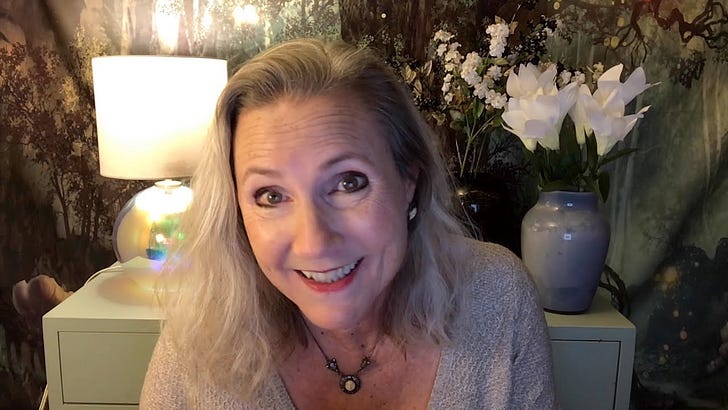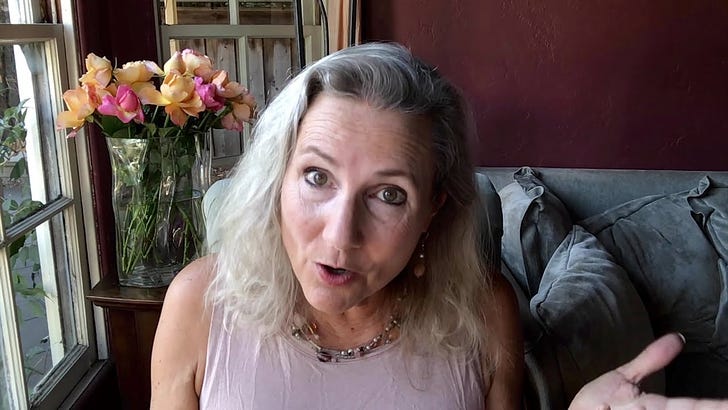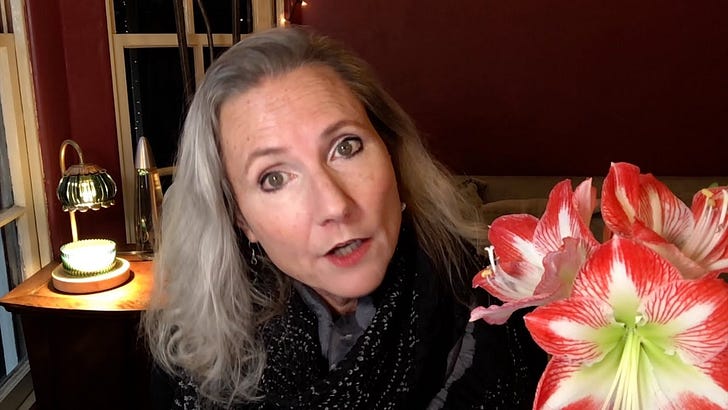Nefahotep has been sharing his wisdom and insights on the Isha Upanishad and the Bhagavad Gita, both of which he’s studied in-depth for decades:
In my previous post, Bhagavad Gita & Palestine, I added insights from my study of the gnostic gospel of Philip and from A Course in Miracles, which I’ve studied daily for a couple of decades. I’m going to continue that here because I think there’s much commonality and that we are the mystics discerning the depths. As Kathleen Devanney says:
… the changes we are in the midst of—which we are largely still comprehending with tools and references, writings and frameworks from history—will upend so much, that even teachings about eternal truths that were not easy to come by (making them all the more remarkable) will be directly accessible to many. As the time-space settings and corresponding frequencies shift (the best words I have though still frustrating) and move into new bandwidths. Literally what has been happening on our planet, won't be able to and what we strived to see, will become standard knowing.
Mystics and their insights then, won't be rare. (Perhaps even super basic.)
Kathleen and I have also been talking about innate human rights and moral codes, causing me to look up the Universal Declaration of Human Rights. Up until Article 26, these are all ‘freedom from’ or what’s called negative human rights. These all seem perfectly agreeable until I realized they negated the most obvious: the right to self-rule or self-governance.
For the United Nations, this is a way of imposing their superior right to determine morality and judge nations by it. So the conscience of a community is usurped. There’s no respect that every group of people has equal access to what’s right and wrong, and the power to work that out within themselves without interference.
On his post, Nefahotep writes:
There’s no Moral Code, there’s only You:
Sorting out the distinctions between the Seeker way and the Believer way, as seen from the moral sense can be difficult because the view of things from the outside is of course limited to just the outside events and circumstances. Though Morality is mostly Ruled by Mind; it will vary between the two seemingly opposite ways of living, it will also vary among Individuals too. There really are no such things as opposites, that's a mind trick. Ultimately, motives for how we live come from within and that’s where the real work is.
The Isha Upanishad could be a way to show us the true element of Spiritual Freedom that is naturally always there within each of us, manifesting in unique and wonderful ways.
Truth is not found in Uniformity nor Conformity; it can be Seen as Unity manifesting through the Diverse experiences of Inner Self.
On my last post, Orion Dworkin commented:
The best part of any religion books are teaching morals and values to at the very least instill some common respect for self and others. Otherwise we get a bit carried away in interpretations of everything written by those tricksters apparently. Like sacrifices and the cultist phenomenon.
I responded:
Your paragraph got me thinking about the episode I'm working on now, responding to the Isha/ Gita from the perspective of the Course. Something they have in common is that they don't have a moral code. At the same time I'm reading a book of young adult fiction (one of my favorite genres) called The Bad Muslim Discount. It's an interesting illustration of how those moral codes get weaponized and used to impose rule by superiority and domination, including violence. So I wonder if that is a good thing about religion.
The Bad Muslim Discount by Syed Masood parallels stories of a Muslim boy whose family comes from Pakistan to California and a Muslim girl who comes from Baghdad to San Francisco. Without making the characters into caricatures, it outlines the moral choices made, some in response to the outside authority of Islam and some in response to an inner directive often counter to it.
The choices made by the men, out of their sense of honor, are disastrous to the women, particularly the only one you really care about. The author leaves you with the assumption she’s being beaten, perhaps to death, by the father who isn’t her father while the author describes a tender reconciliation love scene between the other two main characters. Did he think we would even read this or, if we did, without resentment and anger? I skimmed and seethed.
In the end, I felt that both the obedience to authority and the rejection of authority were destructive because they didn’t take the relationships between people as primary.
I’m reading a brief introduction to A Course in Miracles. Although my interpretation isn’t always in agreement, it summarizes why forgiveness of others is key:
Although the Course urges us to forgive both ourselves and others, its main focus is on the forgiving of others. Why is this? The answer is to be found in the nature of the ego. The essence of the ego, if we recall, is in an antagonistic relationship with all of reality, with God, others and even ourselves; a thought of separateness from the whole and attack on the whole.
The undoing of the ego is therefore the restoration of our mind’s broken relationship with reality, a reuniting with ourselves, others and God. In this mental process of reunion it is other people who are our most immediate and potent representatives of the whole. God is too abstract. Our true feelings toward Him, both our infinite love and our titanic fear, are buried much too deeply.
We ourselves are not appropriate representatives of the whole, for the ego has so profoundly convinced us that we are separate, that we gain from the loss of others. It is other people who become our best symbols of the whole we have rejected. It is in relation to them that our mind can best work out its severed relationship with totality. …
Forgiveness of others is indeed the single greatest challenge to the ego. Our ego is usually undisturbed by our weak attempts to love God and to feel self-worth but is rocked to the core by a true relinquishment of the entrenched condemnation and fear that keep us separate from another human being. …
Forgiveness goes well beyond the pardoning of specific offenses. It is, in principle, a deep-seated transformation of our entire defensive, suspicious and uncaring posture toward another. And by healing our relationship with one we transform our relationship with everything. … The Course, then, is identifying our belief in the sinfulness and evil in other people as the key element in the dream.
I would go further in saying that pardoning specific offenses is counter to forgiveness. I think it starts by assuming that everyone does everything for a reason. As I say in my episode To Love Me is To Know Me, love isn’t some warm fuzzy feeling, it’s trying to see from that person’s point of view. It isn’t agreeing with their pov, or going along with it or allowing bad behavior to continue. It’s asking ‘why?’ and assuming there is a why, even if you don’t know it.
Where I disagree with this interpretation of the Course is that it sees Jesus Christ as the Voice of the author, and you all know how I feel about that. The Course says that:
It is impossible to remember (re-member) God in secret and alone … The lonely journey fails because it has excluded what it would find. …
The Holy Spirit’s temple is not a body but a relationship.
So it is contradictory that a single person named Jesus would single-handedly be the Christ because he was such a singularly holy and wise person. The Christ can only be found in a relationship.
Rhonda (wildrhody) has pointed out that Judas and Saduj/ Saduc are the inverse of each other. The two founders of the zealot movement were Judas and Saduc or Zadok. Judas was the political leader and Saduc was the Pharisee who was the founder of the Sadducees. I remember someone saying some mnemonic device that the Sadducees didn't believe in the resurrection of Jesus and that's why they were sad, you see.
What the Hasidic Rabbi said on one of my episodes is that they rejected the Torah. So Saduc rejected the right of the Shemitic dynasty to rule from within and Judas rejected the right of the Roman Empire to rule from above. In the gospels, the Hebrews first become Jews, and it’s used as a curse against them. I suspect that Jew and Judean means follower of Judas the Nazarene.
So Judas is the socio- and Saduc is the spiritual of socio-spirituality. Between them they proved that resurrection was inclusive for those who believed in each other. Jesus, representing Josephus, hated the zealots and the Jews and wanted people to believe in him as God, not in each other.
The story of Jesus is the exclusivity of resurrection and being the Christ. Exclusivity is the opposite of the Christ, as it is the opposite of the quiescence and the movement in the Bhagavad Gita and the Isha Upanishad. Oneness can only be found in relationship.
Looks at romance and religion as projecting the ego onto a person or a deity, and why a pedestal is a precarious place to be. Tells a story of a spiritual pick-up artist and how empty words of affirmation are just ways of shushing you because he didn’t understand a word of what you said.
From A Course in Miracles, I look at what forgiveness is and what it is NOT. I trace my journey from the spiritual exercise of applying this to the face of evil himself, Hitler, and the revelations of my subsequent research into history. I then question the origins of fascism with Mussolini's surprising manifesto. And I answer a commenter who believes we're X missed meals away from murdering our neighbors and the most dangerous people are those who think people are inherently good.
Nefahotep has outlined important lessons from the Bhagavad Gita for today. I add onto those from A Course in Miracles, the gnostic Gospel of Philip, Vanessa Beeley on the ICJ ruling and Myriam Charabaty’s article on Resistance Justified: Unmasking Deceptive Neutrality.






Reposting comment from Rumbe:
Thank you, Tereza. Honored to be included in this fascinating post.
There is always a 'why', yes. "To understand all is to forgive all." My mother was fond of saying this. And she would add, "because we can't understand it all, may as well skip to forgiveness."
As you know, I've been following Paul Wallis and Mauro Biglino and their understanding that the OT was not about God at all, but an infiltrating force that arrived here and took over. Talk about distortions!
Paul sees the new testament and the teachings of Jesus as quite separate and should never have been combined with the OT. He also thinks Jesus was a real guy (I do too) and that his teachings have been hijacked - well, what isn't?
On your larger point that it can't come down to a single person - fully and completely agree, though I don't think Jesus was saying that.
As Paul the apostle said (paraphrasing) God is where we live and move and have our being. This far more immediate understanding of God (which I suggest Jesus taught) is aligned with the Indian wisdom traditions. There is no separating out ourselves from that knowing. We can't get outside of it, so separating us from Creator is the greatest lie of all.
Always appreciate your provoking - in the best way - posts.
Another rich post, Tereza.
Very interesting that at a time of such unraveling and revealing, the topic of morality and moral codes emerge. Our culture has slowly made the subject quaint and anachronistic, as if how we behave in the world is subject to superficial changes, and not part of our being. (Pull up your bootstraps, work hard to achieve the American Dream morphs into Own Nothing and be Happy and both supposedly provide frameworks for being a good person.)
To take these instructions as examples of being a 'good' citizen, well we can clearly see both the folly and the hidden hand in that.
Without acknowledging the innate sovereignty of self (and responsibilities that come with) it's much like throwing out one's compass just before setting off into the forest. (Which is of course, exactly what 'they' want.)
If there really is not a 'self' then, what's the big deal if it becomes part machine?
So appreciate what your posts surface.